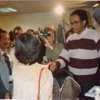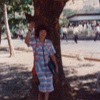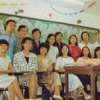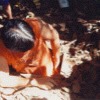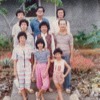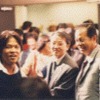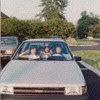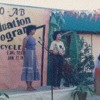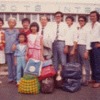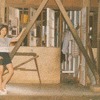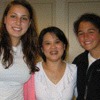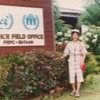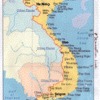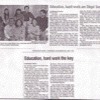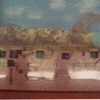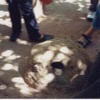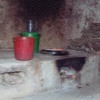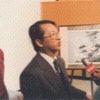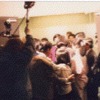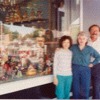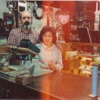

If you see this message, that means that you either do not have the latest version of Adobe Flashplayer installed (install it here) or you have blocked the ActiveX control for Internet Explorer. Please reload the page and allow the control.
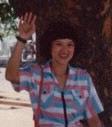 |
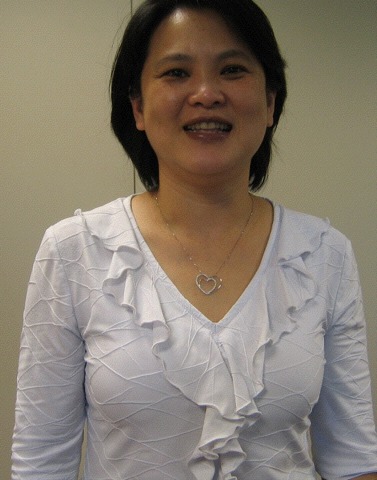 |
|
| Mrs. Hau in Philippines | Mrs. Hau in 2007 | |
| Hau describes how her family evaded the NVA the night the Northern forces invaded Pleiku. | Hau describes her family's encounter with a NVA solider. |
Lynn Hau was born in 1961 in South Vietnam. Hau lived in South Vietnam, witnessing and experiencing the war and its aftermath. Her family moved to Pleiku so that her father could open a department store. As a child, Hau met American soldiers and also saw the atrocities of the war. As the North Vietnamese Army invaded South Vietnam, the Hau family was forced to flee in the middle of the night. With nothing but a few articles of clothing, they moved their way South in her uncle’s van.
Life took a dramatic turn when the Northern forces took Saigon. Hau describes the effects of the union of the North and the South on everyday life. Many people attempted to escape. Her uncle was among the “boat people,” and he managed to reach the United States. He later advised the Hau family to escape by means of the ODP, or the Ordinary Departure Program. The family waited until 1986 when Hau’s uncle, who was their sponsor, was able to provide the money for the program. They were then sent to the Philippines, where they waited until they could be sent to the U.S. Since arriving in the U.S. in 1987, Hau has maintained a positive outlook on life and strongly believes in peace.
Hau Gallery
Q: Just for the record, could you please state your name?
Lynn Hau: My name is Lynn, and my last name is Hau, after I got married. My maiden last name is Diem.
Q: Where were you born?
Lynn Hau: I was born in Vietnam, in South Vietnam.
Q: In which city?
Lynn Hau: In Saigon. South Vietnam divided in Saigon and Chalong. So where I was born is Chalong, but today they call the whole South Vietnam Ho Chi Minh City.
Q: Could you describe where you grew up or what your childhood was like?
Lynn Hau: I grew up in Chalong, Vietnam. And I moved from Chalong to Pleiku. Actually, I brought a map. [see gallery] So this is the South. And you see where Saigon is. This is where I was born. But during the business time, which…I was born in 1961 by the way…so my father moved up here, away from Chalong, which is pretty close to Pleiku. This is where I, where my father moved me up, about here, when I was about five years old. And he started a business there, and that is where I started my school and my father started the business, and that’s where I grew up in my childhood.
Q: Did your dad move you there to start the business?
Lynn Hau: Yes, because my father started the business, and he wanted to get up there.
Q: So were you close to the border between North and South Vietnam?
Lynn Hau: Yeah. We are. As you see, this is the borderline. [see gallery] This is considered the Communist. This is the Northern part. Started from the…see the dark line here; you divide it here. This is considered a Communist system. And here we are; this belongs to the South, which is considered capitalism. And we were influenced by the French and the Americans more.
Q: What was your father’s business?
Lynn Hau: My father had a department store in Pleiku. And we doing very well, and we have a lot of friends. And where we studied is…we were educated in a private school because all of the merchants put money together to build the school. And that’s where I learned my Chinese as well as my Vietnamese.
Q: From what age to what age did you go to school?
Lynn Hau: Like an ordinary elementary school. Our school, where I was, was privately owned. It was from elementary school to junior high, and then, when you started high school, you had to go to another school.
Q: Do a lot of people go to school?
Lynn Hau: Oh yeah, lots of us. Mostly Chinese. You have to learn to be bilingual. Even though we are Chinese living in that school, you have to learn. You are taking Chinese as a main language, but because we live in Vietnam, we have to learn Vietnamese as well. Everybody have to be there as a bilingual to come from that school.
Q: Were there public schools around?
Lynn Hau: Yes.
Q: And were those as good as the private schools?
Lynn Hau: Oh yeah, I think so. The public schools mostly are just learning Vietnamese. Because all the merchants…they are Chinese. They want their children to learn Chinese as well. So that’s why we end up learning Chinese and Vietnamese. We are lucky.
Q: Where were your parents from?
Lynn Hau: My father is from China, and my mom is, at first, before the war…she lived in North Vietnam. But I think during 1957, when the North and the South…they always had war, they were fighting all the time. So my mom escaped the North to the South. And that’s where she met my father.
Q: Was it hard to escape?
Lynn Hau: Um, it’s okay. It’s not like really violent. But sometimes when the people who are richer…they can find a way just to move instead of escape. It’s not really a great war yet back at that time. So my mom just kind of moved from the Northern part to the Southern part. During the war of 1975 [that] we [had] to go through, that was dangerous. And that was the time that North and South is totally considered one, emancipated. Then there is a big change. And that is what…makes a different story, which is what brought me to this country, and we will get to that later.
Q: So did your mom go from North Vietnam to South Vietnam because she wanted to escape the North?
Lynn Hau: Part of it is because of the war. Yeah, they want just to leave that place, but at that time, it’s not as violent like later on. So it’s just move. Because my grandfather is a pretty wealthy family, so they just left. They just sold their business, and they left. They came to the South and start another life. And they bought a house, and they started there. It’s not bad at that time because I wasn’t even there.
Q: Did you have any brothers and sisters?
Lynn Hau: I had seven of them. Big family.
Q: Are you the oldest?
Lynn Hau: I’m the oldest daughter. I have two brothers, and I’m the third, but I’m the first daughter. I’m the older daughter. And I have two younger brother and two younger sisters.
Q: Did any of your brothers fight in the war?
Lynn Hau: No. They didn’t fight in the war. They are not the soldiers.
Q: Was it hard to not be a soldier?
Lynn Hau: It wasn’t hard but when the government wanted to get you into the military. When your name is on the list, you ought to go. You have no other choice. But at that time, they were younger; they didn’t get to that age yet.
Q: So they didn’t get drafted?
Lynn Hau: No. Not really. Not yet. Almost because when I left Vietnam, I am 26.
Q: What is the age that people get drafted?
Lynn Hau: I think over in Vietnam, it is the same: at 18. But they didn’t get called in. Usually they have to call you in. Once you are drafted, you have come in and get your name. But my brother didn’t get called.
Q: Did you have any family friends or did you know anybody that got called into
the war?Lynn Hau: Not that we know of. But when my father had the business in Pleiku…because we do business, we do have a lot of soldiers. Sometimes they come and buy things. We have a lot of connection and little chatting. You know, like a customer, when they come to the shop, they talk with you. We talk with a quite a few of the people. And some of them become good friends of my father. And calling to my memory, at that time I was very young, and some of them were from the air force. Some are Chinese. To be in the air force you have to speak fluent English as well as Vietnamese or Chinese. We have a lot friends.
Q: So you were kind of in the higher part of society?
Lynn Hau: No, not really. But because we were in business, we had a lot of connection…that you get in touch and you see a variety of people. I remember in the time that I was little, I would see a lot of American soldiers walking by.
Q: What was your first experience with an American soldier?
Lynn Hau: I think they are friendly. And they always complain, “oh, I’m so hot in here.” Sometimes it get to hot they have to take their shirt off. They always like to buy a jack knife. You press it, and it springs like a spring knife. They were friendly. And they gave you gum and candy and canned food. They were nice people to my impression at that time. So I kind of grow up influenced by Americans because we always see them during the business time until the war come up.
Q: Why, when you are in the air force, do you have to speak English?
Lynn Hau: Because they have to understand English; because you have to understand the radar. You have to understand what the connection is.
Q: So all of the technology is in English?
Lynn Hau: Yes. You have to. So they all speak English fluently.
Q: When did you learn English?
Lynn Hau: In school we do. When I was in Pleiku, when you get to 6th grade, you have a choice: you have to take English and Vietnamese and Chinese too. And we start learning some basic one. And after 1975, after the war, when Vietnam got emancipated, I went to down to Chalong, and I start to learn, and, at the, that time, Vietnam become a Communist system, as you understand. If you search on the net, you will see, up to 1975, Vietnam got all emancipated. North and South is considered one. No more capitalism. And it’s all Communism. Then the government says it’s totally learning Vietnamese, no other languages. And, of course, we always afraid of hearing of Communists, Communists. And because we are Chinese, we insist that we want to learn Chinese, so I didn’t go back to school. So I went out and learned English secretly by a private teacher. You pay your own, you earn your own living. A lot of teachers that I go in with, school with…they are American soldiers, they speak English, they have experience, and, for a better living, they become a teacher. You can go in and sign up for a class, like a small group of us and we learn English, and it’s very kind of fun. That’s how you met your friends, that’s how you learned. It’s very memorable.
Q: Was it dangerous to learn English? Could you get in trouble with the
government?Lynn Hau: At first it is. We don’t consider it’s really dangerous. But you can’t really open to the public, “I’m teaching English.” No, you can’t. Mostly privately at the teacher’s house or at one of the classmates’ house, which had a better room, more roomy for us, there is somebody who will organize. And that’s how I learned my English. I went to three different classes. You pay your own, but in a way, it’s lots of fun. You learn and you can chat, and it depend on how you learn your English.
Q: Was it hard at first because…did the Americans speak Vietnamese?
Lynn Hau: To the Americans or to me?
Q: When they were teaching you?
Lynn Hau: Actually, these are the Vietnamese soldiers.
Q: Oh! Not the American soldiers?
Lynn Hau: No, after 1975, there are no more American soldiers. No, you want to take them away! These are the former Vietnamese soldiers who works for the American that they still living in Vietnam. A lot of them are very nice. And I actually lost contact with that teacher, a few of them. Perhaps they left. Perhaps they are in this country somewhere that I didn’t even know where they are.
Q: When did you first come to the United States?
Lynn Hau: I came to this country in 1986. No, I left Vietnam in the end of 86, but the year I came to this country was ‘87 in March. I came to this country from the ODP program. It’s called the Ordinary Departure Program. ODP. That is the way of a…you heard of boat people?
Q: Could you explain boat people?
Lynn Hau: Now, after 1975, when North and South become one and life become a dramatical change, there is no more riches and poors. As Communist, they always says we are always equal, we all feel the same, a lot of rich people…they get confiscated, a lot of property and a lot of things, they got confiscated by the government, and you have no way to against the Communist; that’s not a lot of freedom, in a Communist system like in this country, which perhaps you don’t even know what [Communism] is. But you have no right to say no. When a government says, “that’s too much in here, that’s too much, I’m going to confiscate all your property,” they just took it away; you have no way to react. If you react, they can take you to jail, they can take you to a reeducation camp. That’s how they torture the rich. But that’s part of what we read what the history is, but in reality we are not in the really upper class so we didn’t get attacked from this.
Q: What made you want to come over?
Lynn Hau: Um, that’s a part of the reason. When Vietnam has changed, a lot of the rich people started to escape, escape by boat. You have to bribe the fisherman or some of the government, official government people around the area, so they are able to escape. By giving them gold…in Asia, in Vietnam, they do not trust the Vietnamese government, they don’t trust the Communists, same do I, even today, I still don’t. They say instead of putting money into the bank, they buy gold because gold can be resold anywhere. Anybody can accept that. So they don’t put money in the bank; we pay them in gold. So each perso0n, if they want to escape that mostly at that time, they have to take ten pieces of gold. And one piece of gold at that time is approximately equal to five hundred dollars. So you have to give them five thousand dollars worth.
Q: So did it take your family a long time to raise up that money?
Lynn Hau: For me in that situation, I didn’t come here by illegally. I came here by the ODP program, but who sponsor me is my uncle. My uncle is one of the refugees what is called a boat people, he escaped what I think 1979. That the life is changed, a lot of people are not satisfied with the system, and the rich started to leave and flee the country. A lot of people died in the ocean, risked their lives. Some couldn’t go all at once; they had to secretly stow away. Pay the boat people, give money to the fisherman, or partially of the official government. Everything had to be secretly done, you can’t let the government know about this. But when they escape, sometimes if you go back to search the information, they might say how the pirates raped the women or when they came there were a lot of tornados going on or anything happening on the sea, the boat sink and they die. So a lot of people died that way. And my uncle was one of the refugees that escaped by boat. He arrived in Malaysia. When he get there he wrote us the letters he said, “don’t escape anymore its too dangerous;” you either risk your life you be dead, or you just stand by. In the ocean, if someone doesn’t see you, you are just a tiny piece of something, of the ocean, so if you can’t get help, they are just gone. So he would say, “let me sponsor you officially,” so I think at that time the UN have a meeting, and they say well, there are too many boat people dying in the ocean, and that is a lot of illegal immigrant keep coming to a different country, too many people escaping the country. We need to set up a new thing so that the people can leave Vietnam officially to meet their family or to meet the rest of their family. So from there my uncle start to sponsor my family. My uncle and his family escaped by boat. Then, after he left, he started to sponsor us, and it took us seven years for us to wait for all of the paperwork to be done, and by 1986, at the end of the year, we start to leave the country officially. So you got paperwork, you have to have a sponsor when you want to leave officially. So my uncle is my sponsor.
Q: Did all of your family come at once?
Lynn Hau: They all come at once. And this when we left Vietnam. [see gallery] This is my family.
Q: Which one is you?
Lynn Hau: Skinny! So my uncle sponsor us, he say “well, try to leave officially by the plan.” But there is a time period you have to wait. When it come to our maturity day, we all get called to leave, so we leave officially, to leave the country.
Q: When people were first leaving, did they need ten pieces of gold per person or
per family?Lynn Hau: No, when you leave officially, you don’t have to pay anything. But the United States government pay everything for you ahead of time. They pay for our ticket to get to this country. And after we get a job, and immigration will start sending us a bill. And there is a record of us. They know where we are, they know what we are, and they know all our history. So when we came to this country as a refugee, we don’t come to this country directly. Before I come to this country, they set up a program, they send us to Philippines, which is up in the mountains. It’s an island, and it’s beautiful. When I first got there, I was not happy. Every household on the side you have a small little house, since it’s on a mountain, so it quickly built for all of us, no matter you escape by boat or refugee, no matter if you are leaving the country official by plan…that we all the same. We came [to] the camp. They train us. They give us six months to stay to learn English, and they also teach us about the culture of the United States, so when we came here, we can adjust easier. A lot of people get culture shock, and they get crazy because they cannot adjust the new environment. So this is where we are. [see gallery] I left my house, and my house is better than this one! So I say, “oh my god! Terrible. I don’t want to go in there.” Spiders, dust, dirty. You have to clean your own. I have a friend, who work in the office at the time that I met him, and he left the country before me, with the same program, so I used to have to paper, and I used to have the paper on the wall, so it make the room look brighter. When the wall is dark, it is terrible. It’s not bright enough.
Q: So you have to stay there for six months?
Lynn Hau: Yes.
Q: And all of you have to stay there in that little house?
Lynn Hau: Yes, yes. We are crowded. My father say, well consider, it is only temporarily, and I say, they say you leave Vietnam to the better life to the US, why are they sending me here! But, however, the next day, there is not a stopping moment. So the next day, this is where I took my test. They set us up, everything is under control, so we all leave, and we get to this camp temporarily. Everybody has to be tested on their English level. So, because I learned some English in Vietnam, I kind of understand some of it, so I pass the test, and I get to a higher level. This is part of the setting and the area that took care of by the UN. [see gallery] This is the office where they took care of the all of the boat people and the refugees or all of the immigrant before they coming to the US. So I took a picture as a souvenir. You go on the internet, you can find out the office, they might give you some information about that. And that is in the Philippines. And this is all my classmates. And this my teacher. Those classmates all speak English fluently. At least we understand. I can’t say we are perfectly well, but at least we can speak using simple English for communication. So this whole group here is assigned as the teachers assistant so we can help other refugees who doesn’t understand English at all. So because of that, we have a free trip to Manila, the city of the Philippines.
Q: Was it nice?
Lynn Hau: Yeah, it was nice! ‘Cause when you live up in the mountains and all of the sudden you come into the city, you are like, that’s nice! So you get a little privilege. And my first movie that I watch was Top Gun. Tom Cruise! ...Most of [the students] are living in California.
Q: Do you still talk to them?
Lynn Hau: No, not really. We didn’t get really in touch after we left. Too bad. I kept in touch with two close friends. I do. But not all.
Q: Did most people who left Vietnam come to the United States or did people go
to China?Lynn Hau: Oh, they go to different countries. It depends where your relative or where you sponsor is. For example, my sponsor is here, my uncle is living in the US. So I end up my sponsor is sponsoring us so we end up to be in the US. Like some other friend, if they have a sponsor in Australia, they might end up living in Australia or Toronto. There is a big population too. England. Everywhere. Wherever your sponsor is, that’s where you will be going to.
Q: So was your uncle very powerful?
Lynn Hau: Um, my uncle is pretty well known when he first came. He is a very good painter; he paint real well. Let me see, I have a picture. [see gallery] This is his painting that he draw, and when we came here that night and we saw all the camera, we thought “what’s going on?” because my uncle is the first refugee that live in Concord. Back twenty-seven or thirty years ago. And how did my uncle end up to be in Concord is also because he escaped by boat, and, [because] he worked for the American, you also get an opportunity or a priority to get seeing the interview where they want to locate the refugee. So, he was recognized by his drawing. They recognized the symbol, what some organization that he worked for, the American, so the first parish church is his sponsor in Concord, so he end up in Concord.
Q: Did your family move to Concord too?
Lynn Hau: Yes, we first got to the United States we lived in Concord, and then after that we bought the house, and then we moved to Acton. But my uncle now live in Asia, and his children now live in California now. He is back and forth traveling with his business.
Q: Have you ever been back to Vietnam?
Lynn Hau: Yeah, twice. Vietnam has changed a lot today. Um, five years ago it has changed. Even today is it a dramatical change. I think the Communist system is not very well come by a lot of people. Nowadays, the government, one eye open, one eye closed. They do welcome visitors to come back and visit their families, so luckily we able to come back there twice. And my husband family is still in Vietnam. His mother is still in Vietnam. So at time, we did go back and visit them. It change lot now. Anybody can be coming in now; they just have to have their legal work, and then they will be okay.
Q: Is there still a lot of fighting?
Lynn Hau: Not much now because the war is over. Then American withdrawal. They don’t want to stay anymore. And the North and the South is considered one, they call Communist, but they are much better. Life is much better and life is much easier compared to the time that I left.
Q: When you were there, were you happy that the Americans were there?
Lynn Hau: To me, in my childhood, I like to see American around. It was a lot more fun. Life is a lot easier. You can do business. It’s a freedom of everything, but after 1975, now it is took over by the Communist. You don’t have enough freedom like you used to. But as far as living, we don’t have enough freedom, even today living in Vietnam comparing with the U.S. You don’t get enough freedom. But I still miss the place. That’s where I was born, that’s my homeland. Even though I am a Chinese, yeah, but you need to go ahead and to be good at where you are at. I will visit, but I like to do well here.
Q: Did you see any fighting when you were little?
Lynn Hau: Yes, I went through a war during 1975. I’m here Pleiku. See, I’m a little bit closer. [see gallery] So when the North Vietnamese starting to invading the South in that time…actually, now it is exactly 1975. How many years now? Wow. Thirty-two years. They just had their anniversary in April 30. April 30 is the date that they emancipate South Vietnam. So they started to invade here, province by province, town by town. So that’s how we end up, they end up, here now. So we escape right in the middle of the night. I remember my father taught kung-fu to one of his students. [The student’s] an adult and he’s an American soldier. He’s a Chinese, but he have to be draft, and he have to go to the war. And he know part of the secret that he came to me, to my father in the middle of the night. He said, “the Communist is invading Pleiku. We have to leave. We have to escape.” So here we go. My father just say “get up, pack up” because, at that time, we are very afraid of Communists. We don’t know what they are. We only heard of Communists fighting and they’re scary. So we just have to leave. So from there, we just put everything behind. We just grabbed some clothing, and we escaped. So we run away. Go in the car. By the time we go out in the street, I see load of truck already bumper to bumper on the street. And, obviously, everyone already know Communists is coming, and they all afraid, and they leave. And now we drove. Again on my uncle’s car because my uncle had a big van. So from that time on, everyone put things away. You leave the house, you leave all your property. All you want to do is escape away from the Communists. We don’t even know where we can get to. Just get out of the town.
Q: So you left everything?
Lynn Hau: We left everything.
Q: You just took the money?
Lynn Hau: Just took the money.
Q: So did you have any idea that you were going to have to do this or is it just that night?
Lynn Hau: Just go. No. Just leave. Have no idea.
Q: Did you ever go back?
Lynn Hau: Five years ago, when I took my daughter back, I went back to where I was born with our store. It was already burned down, but they rebuilt the building. I still went back there and have a picture. But that is the war we going through is hard. As we escaped… that was the time they were fighting. Why they are burning our building? Because the former Vietnamese the South soldier doesn’t want the Communist come to take anything so they just shoot a fire arrow into every single building. They fire and let it burn down. They know the Communists coming so even the Communists came, they have nothing to take. But they don’t care about our feelings. They burn everything down. So even when we go back there is ashes. There’s nothing left. So we have to start our life all over again when we get to Chalong and Vietnam South. So we went further down. We escaped by the car, and I remember at that time, one night, there is fire. There were fire from one to another side. So we ran quickly to the car, put our head down, and my father said, “be careful, they’re fighting, there fire.” But when they really up close…I remember one Communist came around when we were really frightened. We can recognize by their uniform. And he say, “it’s okay. We won’t hurt you because you’re civilians. As long as you put a white flag on your car, we won’t fire you.” So whatever white shirt that you can find, find a stick, find a branch.
Q: So did all the cars have a white flag?
Lynn Hau: Yes. You put a white flag, whatever, can see the white flag. That means you surrender. Then they won’t fire us. So that was a bad experience because I remember I saw the fire on the ground. You get shot, you’re gone. And then we have to cross the river. A lot of people died there because some people young or old the people. They died because they can’t survive through that river. And we got rescued by a guy who hold me. And then we went down to Vung Tau, which is close to Vietnam South, very closer to the city. Did they show Vung Tau here? See, we escaped from one here, Dui Ha. We came here, and then, when are really near Chalong, here my uncle is. At that time, my uncle live in Chalong, he drive another car up and meet us, and he bring us to Chalong.
Q: When you were escaping, did ever think it was impossible to go to the other countries [around Vietnam]?
Lynn Hau: It is impossible. You can’t. [We kept moving south] because I know we have my uncle in Chalong. We know we’re going to try find a way to meet him. So we just go along here, but it’s all ocean here; you can’t go anywhere. So we don’t know places more. Even myself…I haven’t been to any of these places. But we just drove by, drove by. Then we met my uncle, and he brought us to Chalong. And then we start our new life again. So, my father started selling cigarettes on the streets and make a living for us, and I also have a copy…you can make a copy on this. [refers to newspaper article] When we came here, my family was also interviewed by the Middlesex news. There’s a little story here. Life isn’t easy when you first came to this country. You have to work hard, you have to get ahead, and you have to be willing to start from all over again. So we went through all that.
Q: Were you guys afraid of the Vietcong?
Lynn Hau: Yes. Very afraid.
Q: Afraid of both the North and the guerillas?
Lynn Hau: Yes. We were very afraid of the North at that time because we don’t know how it is. But after the war is over, I see the North Vietnamese soldier coming along on the street. They are not really scary, but they are just good fighter in the war. They are good fighter, but, because you don’t know them, you are afraid of them. But when we see each other again on the street, if they don’t hurt you and you don’t hurt them. It’s okay. They wouldn’t come across and kill you for some reason. They wouldn’t do that. But I understand they hate Americans because of the war, because American support the South, and that’s how they hate the American. The North hate the American because the American support the South to fight against the North. But people aren’t that scary when you know each others. We are just civilians. We didn’t do anything wrong. So they didn’t hurt us.
Q: Was your mom from North Vietnam?
Lynn Hau: Yes. My mom was from the North at that time.
Q: But she still didn’t like Communism?
Lynn Hau: No. Nobody like Communism. You’re lucky you’re born in the United States.
Q: Did you remember hearing about the Mai Lai Massacre or any of those things while you were in Vietnam?
Lynn Hau: That was in the Northern part. I’m not familiar very much about it, but I heard about it. But I myself didn’t experience that at all. That is totally happened to the people that living in the North part.
Q: Did you ever fear that it would happen in the South?
Lynn Hau: Yes. We are. We are very afraid. That’s why we escaped when we heard Communists were coming. So we just escaped and leave the house in the middle of the night. It wasn’t as scary as much. But I think the Northern part get damaged a lot because by the bombing. We didn’t get ruined that much because we live in the South.
Q: Were there a lot of planes always going over to the North to bomb?
Lynn Hau: Yes. You can hear it. You can hear sometime, all the time, when the war is getting really violent. You hear the airplane all the time. You also hear a lot of gunshot, usually. It’s kind of, “oh, God. Fighting again.”
Q: Did you get sick of it after a while?
Lynn Hau: We’re still afraid though. When we heard a lot of gunshot, where my father business [was], we have an underground tunnel, though. We do have an underground tunnel. When we really heard the violence, we all go to the tunnel because we afraid we get bombed.
Q: What’s the closest you ever were to a bomb?
Lynn Hau: They don’t really get into the city. I think in 1968, there is a real violent fight. We heard a lot of bombing. Business shut down. We closed the store. We see a lot of shot. Across my house there’s a nice big park. And I remember at that time when I peeked through, we closed the door. My father said, “dangerous. Don’t get out there.” I see a lot of soldier, and I see a lot of dead body that they killed[, more of them Communists’,] and they piled them up there. But to [me], I don’t have a very deep impression but I do get scared because all the businesses are closed, shut down. But you’re not allowed to go out anyways. So, can’t see much.
Q: So the tunnel that was under your house…was that part of the Vietcong’s tunnel?
Lynn Hau: It’s not the Vietcong tunnel. It’s just the business people building their own tunnel to protect their own family.
Q: Did everyone build tunnels?
Lynn Hau: No, not everybody do. But because we know the war is always on…and my father did that.
Q: Was it a complex tunnel because we saw some pictures?
Lynn Hau: Our is just a simple small tunnel so the family can hide in. I think went back. This is a picture I actually went to this place. It’s in Bo Chi. It’s near around here. This is an underground tunnel that the Communists built. They build it. I took the actual picture. It doesn’t come out that clear. I went back to Vietnam five years ago, and I visit this place. Now they open. They let the tourist come and see it. See how they build it underground. They have a hospital. They have an asylum like an instant clinic asylum.
Q: Did they cook there too?
Lynn Hau: Yes. This is what they wear at that time. [see gallery] My husband, me and my children. See this hole. At time during the war, they have leaves. They cover it. This is the only hole that they can breathe. How small. But they cover it so the American soldier wouldn’t see it. If you just walking by, you wouldn’t notice. But today, they trim the tree off. They cut off everything to show the tourist how the plot is at that time. You can imagine how big that hole is. My husband…we are Oriental human size, can barely get into that hole. That’s how they sneakily doing all this. Americans, ordinary American people…you can’t go through that hole because it too small. It’s just built for that Oriental size people. How small. My husband has to struggle to get in. He’s a little heavy. And here they covered by the leaves. You couldn’t tell. You could even stand by and walking by.
Q: Can you walk into it, fall into it?
Lynn Hau: No. They might have. Today, they have the hole, though. But at that time, I think they must have something on top. You wouldn’t notice. That’s where they are going down. This is the hole they’re coming up. This is how they cook underground. We went in just to visit. But we would never be able to see this before 1975. You have no idea.
Q: In what cities did they build the tunnels?
Lynn Hau: Go Cong, near the Chalong. Nobody knows. And this is their instant clinic. [see gallery] If the soldier get hurt, or any problem come up, this is their little hospital. It’s that simple. And after we crawl all the way, my children and we crawl from here all the way out to get back. To give you an example to see how small and how the tunnel look like. You can see how small it is. How they breathe. So we walk in a little short distance. Come back out. I can hardly breathe. You can see that tiny little hole. That’s all you can breathe through. But that’s the way they hide themselves. The Communists hide themselves living in there that no one even noticed. We don’t even know. We are in the South, but we don’t know either.
Q: So how long would they live under there?
Lynn Hau: I don’t know how many years.
Q: Would some of them just stay in the tunnel for a long time?
Lynn Hau: No. They stay in the tunnel. It’s for secretly. It for emergency meeting or where they meet. But it’s not living there all the time but [for] during the war when it is necessary that they have some path to go through to meet their people, their agent, whatever you call it today. This is the plane. They still have it there. They feel proud because they shot one of the Americans’ helicopters at that time. They still leave it there for display today.
Q: When you went back to Vietnam, did you find that a lot people still don’t like Americans?
Lynn Hau: No, we all like them. I like them. Nothing wrong with them.
Q: What about the North Vietnamese?
Lynn Hau: Some still against the American because if, for example, during the war, if any family would get killed by the war, they always have [inaudible]. They always do. [But not us] because we are not related to that. So I don’t see any anger in that, but in the Northern part of Vietnam, we still see a lot of people still have the hatred toward American.
Q: When did you first find out that the Americans were going to come into Vietnam when it first started in the ’60s?
Lynn Hau: When is it first started? It’s hard for me to tell you that question because the war…has been going on for a long, long time. I was born in 1961, and the war is already started.
Q: Were Americans already there?
Lynn Hau: Yes. The American already there. Let’s see when I was born and I grow up and I would see American soldier.
Q: So you were used to them? You weren’t afraid of them?
Lynn Hau: No. I think I liked them at that time.
Q: Did you see them every day?
Lynn Hau: Yes, every day. I feel sorry for the American soldier, though, because a lot of them have. [tape switched to other side] When 9/11 got bombed, I was totally questioning why they bombing that building the Twin Tower. So I started to watch TV to find out what’s the reason. That is part of the example the war because they hate American. And they started to hate, and they bombed, but the difference is the North Vietnamese and the people in Afghan is a big difference. The Afghan people, the people who have bombed…they too much hatred. They can’t forgive. And they don’t treasure their life. And they just bomb and bomb and kill the other innocent – even they can kill an American. I think that is really a wrong way of thinking and keeping too much hatred. You have to forgive and have to forget and have a better life. North Vietnam now have changed. Vietnam getting better because people started to forgive and kind of forget because you don’t want to keep the hatred inside of you. And keeping it to the next generation is not worth it. You have to go ahead and have a better life. And the last generation, your previous generation, because of the war…you don’t carry it to the next generation. That’s nothing to do with the next generation. So I really don’t suggest or agree with keeping it for the next generation.
Q: Do you see any connections between the war with Iraq and the Vietnam War?
Lynn Hau: I see some of it, but the big difference that I see is [the Vietnam people] don’t keep all that hatred like the Iraq War, like the Afghan people. We don’t have that kind of hatred. Even I can see some North people…they would prefer going to a better life or forgive or forget, but don’t keep the hatred or kill the innocent. That is something I really disagree with. That is the difference there, don’t you think? You don’t want to keep bombing. Young people with such a bright future like when you were all young. Why [do] some of these young people go on and kill themselves or kill other American? That’s not right. We should learn to forgive and forget it and go ahead and do something else more significant, something better for society. Don’t you think? Don’t you agree that? Don’t keep too much hatred. Or when you have so much freedom in this country. People can buy gun and shot if they’re not happy, and that is a really wrong way to do. You have to give love to someone else. If one person will go through a war, you will realize how much you want to treasure your life. When you see gunfight above your head, you try to escape. You just want to survive. And if you survive and having a better life now, why don’t you go ahead and do better or even make it better for the next generation instead of thinking, “oh I hate them. I have to go back and kill them.” That’s the wrong way to think. That’s what I would think.
Q: When the Americans left Vietnam, were you very scared when the North Vietnamese came?
Lynn Hau: Yes. For that very first month, we all very afraid. We all very scared because we see the street all filled with soldiers, tanks, army cars, army trucks, all on the street. There is no more business transaction. They will come in your house and confiscate and go through how much property, how much cash, how much money you have in your house. You need to report, every single household have to report, everything in your house to the government. The whole system has changed. So we are very afraid. For the first few years we not happy. We not like it because our life have changed. Everybody had to line up to get the rice, and we all got it equal. We can’t go to the store and just buy what we want. You have money; you can buy whatever you want, but not that. At that time no. We all the same. You buying the same amount of rice. They go by how many households. You have ten people, you get how many more rice. Here you got five, you got how many. Just enough for the week. So a lot of restriction.
Q: Were there curfews, like you couldn’t go out after a certain time?Lynn Hau: Yeah, after 12, you aren’t allowed to get out of your house. There is.
Q: Do you remember Diem, like when you were little?
Lynn Hau: Diem? Ngo Din Diem? Yeah. This thing that I brought there is some article
of him in there. But it’s in Chinese. I was younger.Q: So you don’t remember too much?
Lynn Hau: No, because I was too young to know him at that time. But there is a paper
I just read about him. Did he just pass away in New York?Q: No. He died a while ago.
Lynn Hau: No, this is the general. Read the article. Your mother will tell you more.
Q: What was the government like in the South when it was divided along the
border?Lynn Hau: Before or after the Americans?
Q: Before the Americans left.
Lynn Hau: Before, it was just like here. Just everything is free. Freedom. You can do your own business, just like here. If you do well, you are welcome to. You can buy whatever you want. You can build. You can do anything. But we see a big change, and we are not happy. And that’s how a lot of people left the country. After war, after 1975 when Vietnam got emancipate. But before we…we just have a good life. I wouldn’t be here if Vietnam wouldn’t get emancipate. Why am I coming to this country for if I'm doing good over there? My father’s doing well. We all doing well. But because we heard Communist coming, life is getting changed, it’s getting worse. Less escape, less leave the country. We fight. We leave. We looking for a better life. We looking for freedom. We don’t have freedom. So, that’s why we leave.
Q: Were you happy for the emancipation?
Lynn Hau: No, we are not. No, at that time, we are not. That’s why you hear a lot of boat people when they escape. Mostly those people are richer at time. And then the fisherman, there’s a lot of fisherman. They escape too because they are right at the ocean. They have the boat, so they are like, “oh, everybody is leaving. Me too, I leave.” So some of the fisherman, some of them…I don’t say they were uneducated, but they didn’t really go through school a lot. But part of these people are also escaping, leaving the country. It’s easy for them; they have such an easy access. They live right there, so they go to another country.
Q: So did the rich people hide their clothes and they brought gold with them
when they left?Lynn Hau: They had to hide them secretly.
Q: Did someone check whether they had gold and pirates?
Lynn Hau: When they are in the boat?
Q: Yeah, when they are on the way.
Lynn Hau: Yeah, sometimes when people escape, when they stow away – we call stow away – some of the people try to bring a little belonging that they had. I don’t have that experience because I didn’t escape through the boat. But I heard a lot of stories when they bring some, and the pirates, whoever not lucky, get near the pirate boat. Not even just confiscate or take all the belongings that they have, a lot of pretty women get raped or after they raped [inaudible]. Actually my husband is one of the boat people who escaped. And one of his friends, which is a girl, because they escaped, they see some of the incident. And sometimes they tried to make their faces really dirty so they will look ugly in case[, when] the pirates invade it, they [will] say, “oh, that’s an ugly one,” so they not choose it. So yeah, it’s really sad.
Q: Were there ever any protests from South Vietnamese people during the war? And
were they publicized?Lynn Hau: During the war before 1975?
Q: Yeah.
Lynn Hau: There is a few. They do protest. I remember when I was little, I see people protest, I also see a monk from the paper, I think they still have it on one of the book or the paper today…he burned himself. He protest that he doesn’t want to have the war. But what else can we do? You can’t stop the war. One person is not powerful enough. It need to come from people who come together to stop the war. Any country, anywhere, when you go around, there is war going on somewhere. It depend how the government handle the war.
Q: How did you learn about the war? Were there newspapers?
Lynn Hau: Yeah, from the newspapers and also from word of mouth. We hear a lot as you grow up, and from all the gunshot you hear when you are little. And sometimes in the middle of the night, we heard the gunshot and said, “what’s going on?” And the parents would say, “oh, the Communists and the South soldiers are fighting.”
Q: Did you get a lot of news from North Vietnam? Did you hear about what was going on up there?
Lynn Hau: Well, the press…we have freedom of press here. You have freedom to say everything or sometimes it become too exaggerated. In this country, do you agree?
Q: Yeah.
Lynn Hau: But in Communist system, or even in the South, even though we are capitalism that I think Vietnamese government does not allow or tell us all the truth. You won’t. But I only remember I was watching TV that night. The morning before Vietnam get emancipate, and [inaudible] is the president at that time, he is the government of the South. And he left after he announced his speech. I always remember he say, “now listen, don’t ever believe what the Communist say and see what they do.” We call actions speech louder than words. Then that’s his last impression that he made. And I remember I stare in the TV, and then he left. And the next morning we heard the North soldier coming along. We heard songs they were singing, and we heard gun fight and all the tanks and army trucks coming on the street. And the whole thing have changed. We went through; three times they changed the currency. They announced to us, “no, it’s not true, but in an hour later, they say yes, the whole currency has changed.” Every single household, [it does] not matter how rich or no matter how much money you get, you only get certain amount [for] all of the household. And everybody become poor.
Q: So is that the way the Communist worked?
Lynn Hau: Yes. Three times they are doing that. I remember one night, it is really late. No. At first, it is like an evening. I saw people run to the market, buying things, saying “lets spend the money and buy whatever necessary, leave it in the house.” The object that you buy is there, but the money will become a piece of paper, useless. But some people heard the rumor, “the government is changing the currency.” So by 6 o’clock or so, the government will have a truck driving around the street and say, “don’t believe the rumor, we are not changing the currency.” Okay, by 12 o’clock midnight, the TV is on, one of the officers sitting on the TV talking to the public and saying, “now, from this moment on, all the present currency has become invalid. We are not using that money any more. Tomorrow every household will line up to get a certain amount of money for each household. No matter how many members you have in your house.” You see, that’s how we become very poor, and we become very mad because we don’t trust the government. And that’s why you can imagine why people try to escape and leave the country. Well, we don’t trust them. And because too many people escape…they buy gold, they save them, they left, and too many people are dying in the ocean. Then the United States started with the ODP program, and that’s how I come to the country: by that way, which I’m lucky of because I don’t have to escape by boat. I came here by plane. And we get a little train [when] I [got] there. And then we came here, and we still have to start all over again. So, now you see.
Q: Did the people who owned stores…did they make sure to keep their food and
hide it?Lynn Hau: They don’t have to hide. If they have it…gradually, it will be all consumed. Well, they might not give it to other people [for] free, because, when it come to a certain moment, people become selfish because they want to make sure if people open a grocery store, they might not be getting stuff early because they have plenty in their house. And for the poor, if they don’t have enough, they will get hungry.
Q: Did food ever become scarce because of the war?
Lynn Hau: They gave you enough, but they don’t give you plenty. So it’s all right. But not as rich as we want. If you want a hamburger, you can’t have a hamburger. No, you just have enough, or sometimes not enough. But we wouldn’t be starve or die of hunger.
Q: So, 1975…the Americans left, and so the people who were helping the Americans…did you see what happened to them when the Communists came?
Lynn Hau: When the Communists came, I hardly see many American left.
Q: The South Vietnam people who were friends to the Americans?
Lynn Hau: I don’t see them. Perhaps…even whatever they do, we don’t even get a chance to see. These…the Communists…they do things very secretly. All the soldiers, the former soldiers, who work for the Americans, which is the South soldier, they all have to go to the reeducation camp. You immediately get called to the reeducation camp and what they call a “brain wash.” And how bad they treat them…you have to see them on the news, on the paper. But we don’t get the right [to]. We don’t get to see it. They wouldn’t tell us or they don’t even show us. But we heard a lot. A lot of them get tortured. A lot of them get released if they have a certain way. We are the…just the civilians, so we didn’t have a connection with that. But I hear a lot of sad things. But a lot of other people…they get away to escape also, which is lucky. At the very last minute, you will see a few airplanes they left. I myself witnessed one airplane get shot by the Communists. At that last minute, I heard it’s a family. They belonged to the military, so they probably rich. They have their own plane. They escape at that last minute. But Vietnam just get emancipate. The North just took over. I remember, just after lunch, I step out, and I saw a gun shot. Bang. Then I looking up, and I saw an airplane…the tail start to have smoke. Then I can see the airplane start to come down. And it get dropped in one of the building, and it killed a lot of other people, too, that lived in that building. So, how sorry it is. I really don’t know. But you can imagine when you read those books, it could be a true story. So you are lucky; we have to consider that we are lucky. We are born in the United States. So do well, and keep ahead. And love yourself and love others.
Q: All right. Thank you so much!
Lynn Hau: You’re welcome. It’s a pleasure. I hope it will help you to get some information.
Q: Yes, it was very helpful.
Lynn Hau: Keep up the good work!
